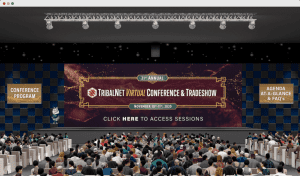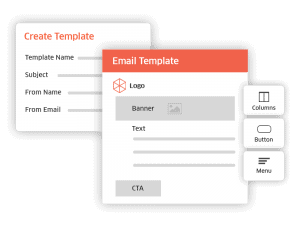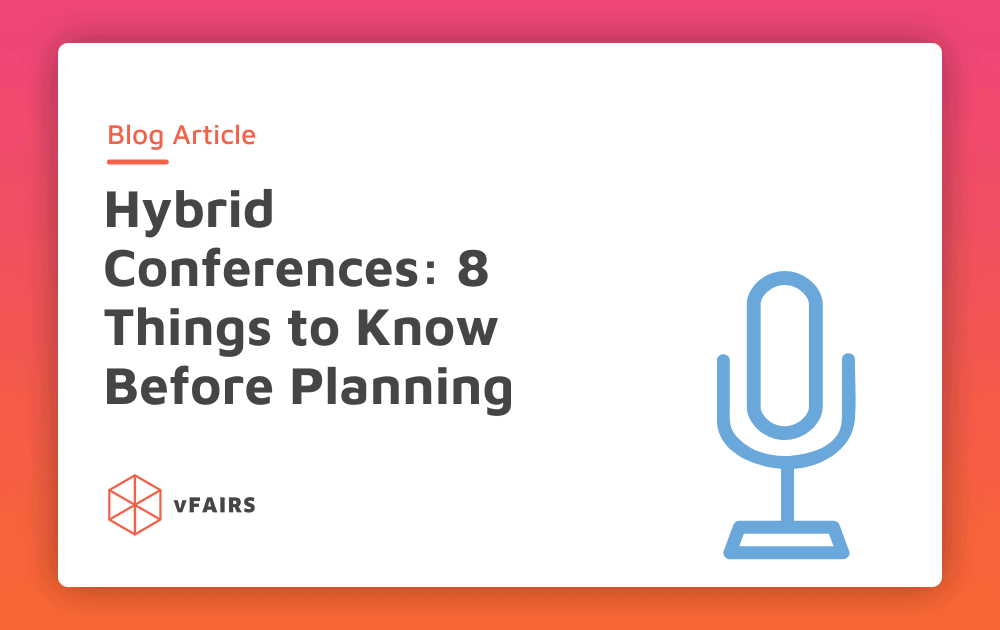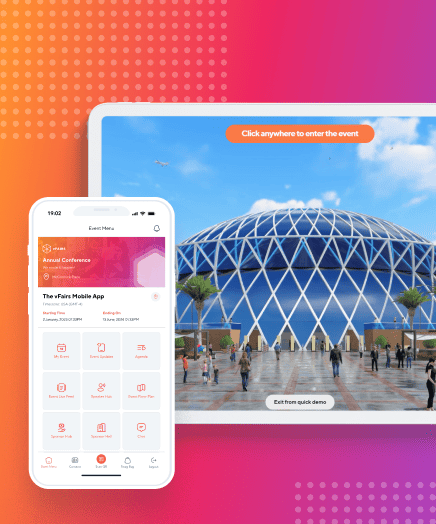Finally, the vaccine is here and event organizers/planners are naturally itching to get back to planning live, in-person events. But with the continued threat of this global pandemic, along with recommendations against crowded, face-to-face gatherings, going back to the same old live events routine is still a challenge.
In this situation, a hybrid conference strategy is everything you are looking for. As it will enable organizers to supplement the audience with online participants, hosting smaller live audiences at the same time, the strategy is the ideal one. At the same time, due to the involvement of face-to-face along with virtual participants, hybrid events have their own set of planning challenges.
To help our planners and organizers to decide if a hybrid event is right for them, vFairs compiled some of the most important questions you’ll want to consider before planning your next hybrid conference.
Introduction to Hybrid Conferences
A hybrid event is simply defined as a meeting, event, conference, or even a trade show that perfectly mixes an in-person component with the virtual experience. When it comes to a hybrid event, the scope of the digital component can widely vary. It usually encompasses everything starting from Twitter chats to flipped classrooms, live stream sessions, virtual networking experiences, and much more.
In short, there is no set rule for what a hybrid format may look like in 2021, so you get creative with everything that makes sense for your event, goals, and audience the most.

Questions to Ask Before Planning a Hybrid Conference
Here are some top questions to ask during the planning stage of your hybrid conference:
1. Is a Hybrid Event Different from a Virtual Event?
Unlike a pure virtual event, that takes place online exclusively having a virtual audience, a hybrid event also includes in-person attendees along with the virtual ones.

2. How Do You Staff a Hybrid Conference?
A hybrid conference mostly requires even more staffing adjustments as compared to virtual events. This is to ensure that attendees enjoy a worthwhile experience, whether they join in person or online.
There are several key roles to consider when making your hybrid events team. Some of the common examples include an event technologist on the virtual side to help select the right technology, and an executive producer to ensure all the virtual aspects of your event are running smoothly. As for the in-person event team, an onsite technician must be hired to check on microphones and internet connections, and a speaking coach will be responsible for helping your presenters communicate to both audiences effectively.
3. How Will a Hybrid Conference Benefit Me?
A hybrid event is usually defined as a natural step for event organizers who wish to move forward towards the old live events routine but face government restrictions. Even participants sometimes are hesitant to travel and gather in groups due to pandemic situations.
Also, hybrid conferences offer some additional unique advantages such as cost-effectiveness, unlimited scalability, increased reach, better audience insights, better ROI, valuable data collection, and a powerful unified message that can reach people present anywhere on the globe.

4. What Sort of Technology is Needed in a Hybrid Event?
You need better technology when it comes to increased production considerations. Some important technical aspects to consider are:
- Having live event support at a broadcast level.
- A minimum of one professional camera per room, along with the good quality sound recording.
- Consider having multiple camera angles in the room for a truly high-quality stream.
- A hybrid event platform offering Interactive features for in-person as well as remote attendees to engage in a better way.
- A virtual event platform where attendees will learn about and access the content presented in your event. Also, a place to host recordings after the event is done.
5. What Challenges Will I Face in Hybrid Event Management?
Virtual and live audiences are two different bodies having many different needs. In order to create a unified event experience for both, you’ll need to account for both of the audiences’ needs. Some important points to consider are:
- How to adapt content and create a digital experience that will keep your virtual audience as well as your in-person audience engaged?
- Is there any need for additional moderators for the purpose of facilitating discussions with the online audience?
- Are you ready to invest in the additional health and safety resources that will enable your live audience to meet physically, face-to-face?
- With social distancing still surrounding us, how will you create an in-person experience to make live participants feel more special?
6. Who is Going to be My Audience?
When planning for a hybrid conference, you will never want to make assumptions. However, the profession and age of your audience may affect your in-person turn-out. For example, if the majority of your audience is over 50, they may be less willing to attend a face-to-face gathering whereas a younger audience may not consider this. Also, an audience composed of healthcare professionals majorly may also tend to be more conservative when it comes to face-to-face meetings unlike an audience of software developers.

7. What Type of Venue is Suitable for Hybrid Conferences?
Some of the top event spaces like hotels, that made better sense pre-pandemic, might no longer have space. Nor amenities to fulfill your needs. Although minimum spends might still be in there, despite the fact, a small fraction of attendees might safely be able to attend the hybrid conference.
On the other hand, hybrid events bring new opportunities. You can seek out new spaces that lack added costs such as food and rentals. You’ll want to consider venues that offer built-in new tech and fulfill production needs. You can also consider a partnership with a brand that owns an existing hybrid infrastructure that is already in place. You can avail of this in exchange for some branding control.

8. Are Marketing Strategies Different For a Hybrid Event as Compared to Face-to-Face Event?
You’ll utilize the same channels that are best to market live events, to market hybrid events. The channels include social media, email marketing, paid advertising, content marketing, etc.
The only difference is the timing of your marketing efforts for hybrid events. At vFairs, as we’ve greatly helped our clients switch to virtual events, they’ve seen a dramatic increase in registration numbers the week before their event. This is a completely different trend as compared to what planners typically see with in-person events. In order to maximize your online audience, it is essential that you increase your marketing efforts. You need to do this the week before your hybrid event takes place.

Key Takeways
Your hybrid event can be a huge success as long as some key considerations are taken into account before beginning. Matched with conscientious planning, a robust and highly immersive hybrid events platform will help you plan the most effective, ROI-driven events you’ve ever hosted! Click here to learn more about our hybrid events solution.


